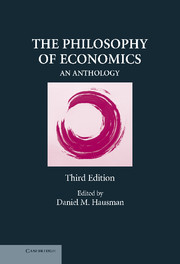Book contents
- Frontmatter
- Contents
- Introduction
- PART ONE CLASSIC DISCUSSIONS
- 1 On the Definition and Method of Political Economy
- 2 Objectivity and Understanding in Economics
- 3 The Nature and Significance of Economic Science
- 4 Economics and Human Action
- 5 Selected Texts on Economics, History, and Social Science
- 6 The Limitations of Marginal Utility
- PART TWO POSITIVIST AND POPPERIAN VIEWS
- PART THREE IDEOLOGY AND NORMATIVE ECONOMICS
- PART FOUR BRANCHES AND SCHOOLS OF ECONOMICS AND THEIR METHODOLOGICAL PROBLEMS
- PART FIVE NEW DIRECTIONS IN ECONOMIC METHODOLOGY
- Selected Bibliography of Books on Economic Methodology
- Index
4 - Economics and Human Action
Published online by Cambridge University Press: 05 June 2012
- Frontmatter
- Contents
- Introduction
- PART ONE CLASSIC DISCUSSIONS
- 1 On the Definition and Method of Political Economy
- 2 Objectivity and Understanding in Economics
- 3 The Nature and Significance of Economic Science
- 4 Economics and Human Action
- 5 Selected Texts on Economics, History, and Social Science
- 6 The Limitations of Marginal Utility
- PART TWO POSITIVIST AND POPPERIAN VIEWS
- PART THREE IDEOLOGY AND NORMATIVE ECONOMICS
- PART FOUR BRANCHES AND SCHOOLS OF ECONOMICS AND THEIR METHODOLOGICAL PROBLEMS
- PART FIVE NEW DIRECTIONS IN ECONOMIC METHODOLOGY
- Selected Bibliography of Books on Economic Methodology
- Index
Summary
Frank Knight (1885–1972) was born in Atlanta and received his Ph.D. in economics from Cornell. He taught at Cornell and at the University of Iowa, but he is particularly associated with the University of Chicago, where he trained a whole generation of prominent economists. Knight not only made major contributions to economic theory, but he was a social philosopher as well, deeply concerned with the problems of individual liberty. His insistence on the importance of uncertainty and on the peculiarities of the human subject matter of economics is still worth careful consideration by all those interested in economic methodology. Knight's essay, “Value and Price,” is reprinted here in an abridged form. The first third of the essay, which is mostly historical background, is omitted.
In general, if explanation of economic behaviour in terms of motives is to be abandoned, a number of alternative possibilities are open. Perhaps the simplest is the one analogous to a trend in physics – to do away with all “explanation” and merely to formulate empirical laws; the result is statistical economic theory, having for its content the objective phenomena of commodities and prices alone. A second line of development away from the types of value theory represented by classical or utility economics centres around the emphasis on the social control of economic life with clearly implied advocacy of such control.
- Type
- Chapter
- Information
- The Philosophy of EconomicsAn Anthology, pp. 100 - 107Publisher: Cambridge University PressPrint publication year: 2007



